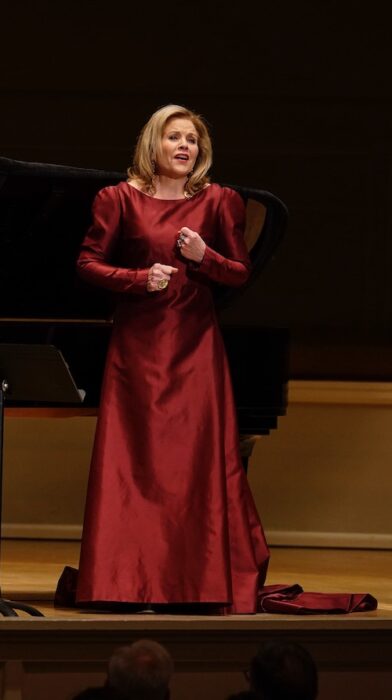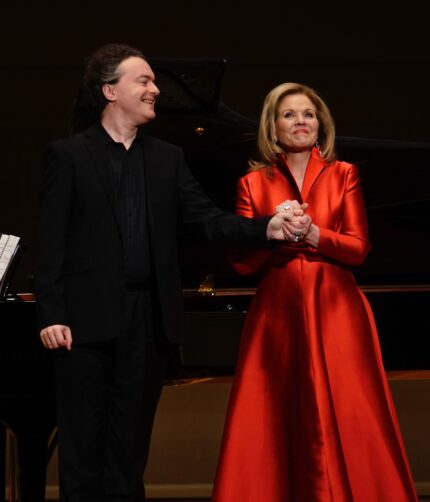Fleming and Kissin enhance each other’s art in Chicago recital

On the face of it, pairing classical superstars Renée Fleming and Evgeny Kissin in a duo recital had the makings of an artistic mismatch.
After all, the American operatic and concert diva and the virtuosic Russian pianist come from different musical worlds, separated by differences of culture, repertoire, training and temperament. Beyond the commercial considerations, what could possibly be gained from such a collaboration?
Quite a lot, actually, as their thoughtful and rewarding duo recital, co-presented by Symphony Center Presents and Lyric Opera of Chicago, demonstrated Sunday afternoon at Orchestra Hall.
This was a concert of particular interest to connoisseurs of Romantic art song and listeners curious to experience Fleming’s vocal artistry on a more intimate scale that what they have been accustomed to hearing at the Lyric (where she presently holds the title of special projects advisor). Songs of Schubert, Liszt, Rachmaninoff and Duparc were carefully chosen to display vocal resources the soprano has husbanded with great care in the course of her remarkable career.
Besides offering Kissin’s admirers a chance to hear his elegant renditions of keyboard miniatures by Liszt and Rachmaninoff, the recital brought to the fore his unsuspected skills as an accompanist. As with Fleming, artistry that is more typically directed outwards was sensitively adjusted to the inwardness of expression necessary for success in art-song interpretation. There were a few moments in which mannered deliberation threatened to trump spontaneity, but they were only moments.
At 64, Fleming looked as glamorous as ever, swaddled in a different designer creation for each half of the concert—the first a silken, high-necked vermilion gown, the second a striking maroon affair with puffy shoulders and a voluminous train.
Even if the diva has sacrificed a bit of vocal freshness and tonal fullness to the passing of time, her instrument remains in remarkably fine shape, the vocalism glorying primarily in a still-velvety midrange with breath control that allowed her to sustain long phrases into infinity. Nothing in the German, Russian and French songs placed undue strain on her beautiful voice, while her interpretative intelligence was, if anything, even more pronounced than one recalls from previous recitals.
Four Schubert songs to texts by Goethe and Friedrich Schlegel made a satisfying opening group. The simple charm of “Die Vögel” showed off Fleming’s skills as a vocal storyteller while providing contrast with the poignancy of Mignon’s lied and the resolve of “Rastlose Liebe.” Each song benefited from Kissin’s finely judged accompaniments.

The pianist had the stage to himself for two pieces by Liszt, the first a bridal song drawn from Book Two of the Years of Pilgrimage (Italy), the second being the familiar Valse Oubliee, No. 1. In the former piece, a miniature tone poem, lyrical tenderness gave way to a majestic tolling of wedding bells and a benediction. Immaculate fingerwork and subtle rubato enhanced the dance impetus of the latter.
The rippling undercurrent of Kissin’s accompaniment to “Im Rhein, im schoenen Strome” was one highlight of a group of Liszt settings of poems by Goethe, Heine and Victor Hugo, divided across the interval. Fleming sustained the low-lying, then soaring, phrases of “Über allen Gipfeln ist Ruh” (Over Every Mountaintop Is Peace) nicely, drawing out the final phrase in a single breath.
Even so, the highlight here was the tonal beauty and close identification with the emotional world of Liszt’s “Oh! quand je dors” (Ah, while I sleep). The song sat beautifully on her voice, as indeed it did on the keen harmonic support of her accompanist.
A selection of four Rachmaninoff pieces was highlighted by both the original vocal version of “Lilacs” (Op. 21, no. 5) and the composer’s arrangement for solo piano, the latter inadvertently omitted from the printed program.
Kissin came into his own with the “Melody and Serenade” from Rachmaninoff’s early Fantasy Pieces (Op. 3), making much of the seguidilla rhythm of the serenade. The Slavic soulfulness of both songs found Fleming shifting easily from a darkly sensuous lower range to a secure top.
The Henri Duparc songs “Extase” and “Le manoir de Rosemonde” (Rosemonde’s Manor) gave way to two encores: Rachmaninoff’s “Spring Waters” and a Fleming specialty, Richard Strauss’s “Morgen” (Tomorrow).
The undulating arpeggios of the piano part to the Strauss song kept the deliberate unfolding of the vocal line from becoming becalmed. Fleming affectingly projected the reconciliation and hope of John Henry Mackay’s poem through the ravishing simplicity of Strauss’ setting. It was as if time was suspended in a moment of rapturous stillness.
The program will be repeated May 27 in Kalamazoo, Michigan, and May 31 at Carnegie Hall in New York. carnegiehall.org